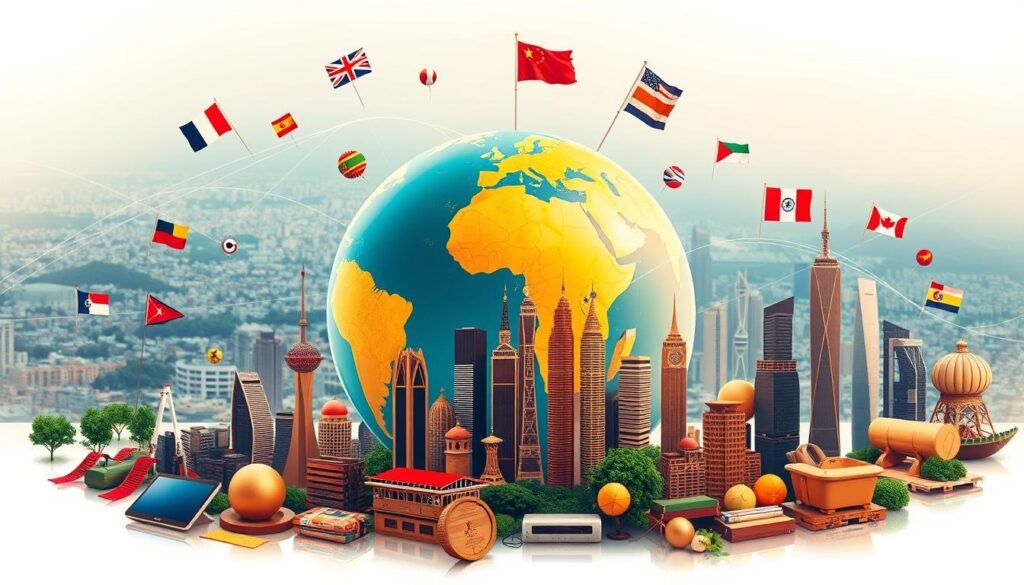soft power : In today’s world, countries are not just fighting for power with armies. They also use soft power to win over others. Soft power means using charm and persuasion to get what you want, not just force.
This approach is key in international trade and business. Countries with more soft power get more foreign investment and trade more. Things like cultural diplomacy and branding help countries stand out on the global stage.
Now, big players like the United States and China are focusing on soft power too. This makes soft power very important in trade and business.
Key Takeaways : soft power
- Soft power is the ability to influence others through appeal and persuasion, rather than coercion.
- Countries are competing for global influence not just through military might, but also through soft power strategies.
- Soft power is linked to higher levels of foreign direct investment and larger trade volumes for countries.
- Cultural diplomacy, nation branding, and business diplomacy are crucial in shaping a country’s global economic influence.
- The relationship between soft power and international trade and business is becoming increasingly important.
Introduction to Soft Power
Definition and Concept of Soft Power
Joseph Nye, a Harvard University professor, first talked about soft power. It’s about a country’s ability to influence others around the world. This is done through attraction or persuasion, not by forcing others to do something.
Soft power is different from “hard power,” which is about military strength and money. Soft power uses things like culture, ideas, and a good reputation. It helps a country get what it wants without using force or money.
Soft power works by making others want to follow its lead. This is a big change from the old way of thinking, which was all about forcing others to do what you want.
“Soft power is the ability to obtain preferred outcomes through attraction rather than coercion or payment. A country’s soft power rests on its culture, political values, and foreign policies.” – Joseph Nye
Countries can use soft power by building a good global image. They can share their culture and political ideas in a way that draws people in. This helps them shape global events and reach their goals. In today’s world, soft power matters a lot because it’s all about how you connect with others.
Measuring Soft Power
The Global Soft Power Index, created by Brand Finance, helps us understand a nation’s soft power. It looks at 11 key areas of soft power. These areas fall into three main groups: Soft Power KPIs (familiarity, reputation, influence), Soft Power Pillars (culture, education, science, media, business, governance, international relations, people, values), and the effect of Covid-19.
This Index uses data from over 75,000 people in 102 countries and 778 experts. They come from fields like academics, government, and business. This mix gives us a worldwide view on a nation’s soft power.
| Soft Power Dimension | Key Metrics |
|---|---|
| Familiarity | How well-known and recognizable a country is globally |
| Reputation | The overall perception and standing of a country |
| Influence | The ability of a country to shape global events and opinion |
| Cultural Resources | A country’s cultural exports, heritage, and global appeal |
| Education and Science | A country’s educational institutions, research, and innovation |
| Media and Communications | A country’s media, entertainment, and digital platforms |
| Business and Trade | A country’s economic, financial, and commercial clout |
| Governance | A country’s political stability, transparency, and global leadership |
| International Relations | A country’s diplomatic influence and global engagement |
| People and Values | A country’s citizens, culture, and social values |
| Covid-19 Response | A country’s handling of the pandemic and its global impact |
This detailed way of looking at soft power gives us deep insights. It shows us what makes a nation influential worldwide.
Soft Power and International Trade
Research shows a strong link between a country’s soft power and its success in international trade and investment. Soft power is closely tied to foreign direct investment (FDI) and trade flows.
A study by Brand Finance found that soft power explains 34% of the variation in global FDI inflows and 60% in trade flows. Experts from EGADE Business School and Morningside University agree. They say that as emerging economies grow, they become more important in trade and investment.
The Virtuous Cycle of Soft Power and Economic Success
This creates a cycle where strong soft power boosts trade and investment. This, in turn, improves a country’s global reputation and soft power. Nation branding, cultural diplomacy, and business diplomacy are key to using soft power for economic success.
| Factors Driving Soft Power and Export Success | Impact on International Trade and Investment |
|---|---|
|
|
Countries that use their soft power well can see a big boost in their trade and investment. This creates a cycle that strengthens their global position and economic influence.
Impact on Global Business
Soft power greatly affects global business and corporate branding. Countries with strong soft power draw more foreign investment and trade. This creates a win-win situation for nation brands and corporate brands linked to them.
Companies use a country’s soft power and good name to stand out. Iconic brands help show off a nation’s image worldwide. This idea of “location branding” helps businesses connect with a country’s identity and resources.
For instance, German car makers use the country’s engineering fame. Singapore Airlines shows off Singapore’s brand worldwide. Soft power is key for nations wanting to boost their global appeal and draw in international businesses and investors.
| Country | Soft Power Ranking | Top Corporate Brands | Investment Attraction |
|---|---|---|---|
| Germany | 4 | Mercedes-Benz, Volkswagen, BMW | High |
| Japan | 6 | Toyota, Sony, Nintendo | High |
| Singapore | 20 | Singapore Airlines, DBS Bank, Changi Airport | High |
“The strength of a nation’s soft power is directly proportional to the global competitiveness of its businesses and brands.”
Also Read : How Do Political Disputes Impact Cybersecurity Around the World
Conclusion
Soft power is now a big deal in international trade, investment, and global business. Countries seen as forces for good often do better economically. They have more exports, more foreign investment, and more trade.
This shows how important cultural diplomacy, nation branding, and business diplomacy are. They help a country stand out and do well globally.
As the world gets more connected, being able to attract and persuade with soft power matters a lot. Countries and businesses need to focus on summary of soft power impact, international trade and business, soft power strategies, cultural diplomacy, nation branding, business diplomacy, global influence, and economic competitiveness.
The link between soft power and economic success is clear. It’s all about using cultural, political, and diplomatic tools to boost global influence and economic competitiveness. In a connected world, those who use soft power well will lead globally.
FAQs
Q:What is soft power and how does it differ from hard power?
Soft power is about influencing others with charm and persuasion, not force. It’s different from hard power, which is about military and economic strength.
Q:How is soft power measured?
The Global Soft Power Index looks at 11 key areas. These include things like culture, education, and media. It also looks at business, trade, and how a country is seen by others.
Q:What is the relationship between a country’s soft power and its international trade and investment performance?
There’s a strong link between a country’s soft power and its trade and investment. Soft power helps with branding and diplomacy, which can increase economic influence.
Q:How do soft power perceptions impact global business and corporate branding?
Countries with high soft power have better business climates, drawing in more investment and trade. Companies use a country’s good name and soft power to make their products stand out.
Source Links
- https://www.forbes.com/sites/courtneyfingar/2024/02/29/what-is-soft-power-and-does-it-impact-trade-and-investment/
- https://brandfinance.com/insights/soft-power-why-it-matters
- https://www.nber.org/system/files/working_papers/w21537/w21537.pdf







